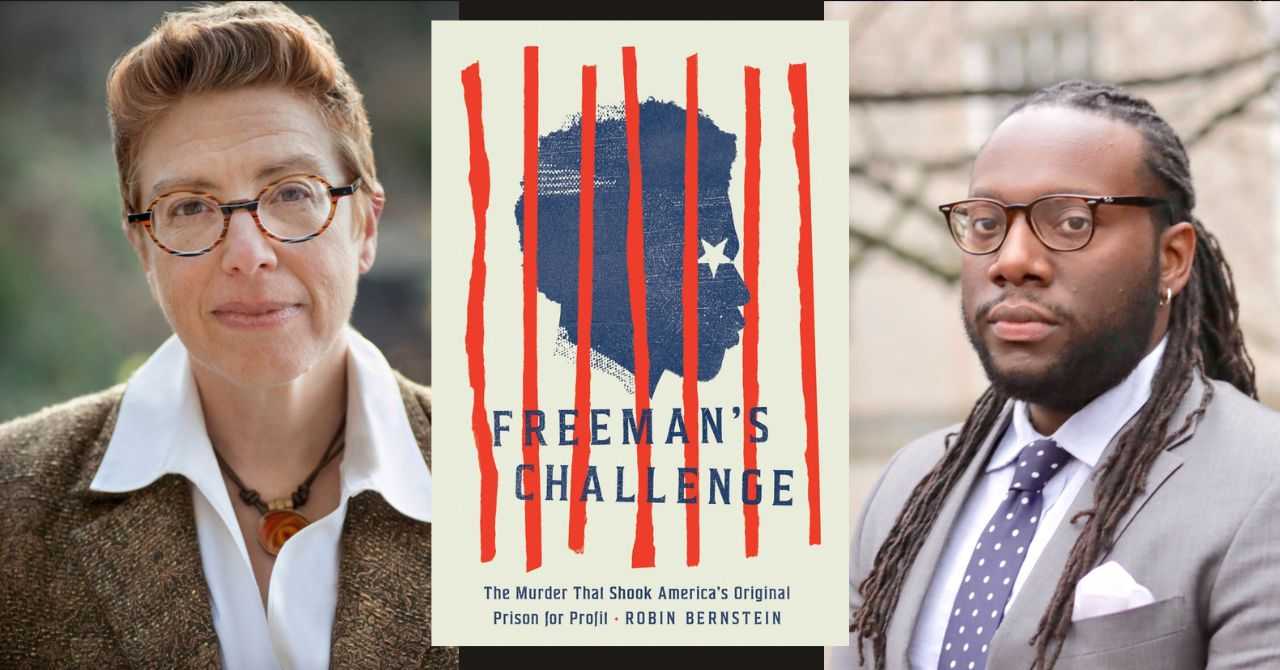- Cafe
- Bookstore
- Upcoming events
- Book an event
- Catering
- Institutional and bulk sales
- About Red Emma's
- Press
- Buy gift cards
- Red Emma's merch
- Donate to the Red Emma's Education Fund

Robin Bernstein presents "Freeman's Challenge: The Murder that Shook America’s Original Prison for Profit" in conversation with Julius Fleming
This event has already happened.
In the early nineteenth century, as slavery gradually ended in the North, a village in New York State invented a new form of unfreedom: the profit-driven prison. Uniting incarceration and capitalism, the village of Auburn built a prison that enclosed industrial factories. There, “slaves of the state” were leased to private companies. The prisoners earned no wages, yet they manufactured furniture, animal harnesses, carpets, and combs, which consumers bought throughout the North. Then one young man challenged the system.
In Freeman's Challenge, Robin Bernstein tells the story of an Afro-Native teenager named William Freeman who was convicted of a horse theft he insisted he did not commit and sentenced to five years of hard labor in Auburn’s prison. Incensed at being forced to work without pay, Freeman demanded wages. His challenge triggered violence: first against him, then by him. Freeman committed a murder that terrified and bewildered white America. And white America struck back—with aftereffects that reverberate into our lives today in the persistent myth of inherent Black criminality. William Freeman’s unforgettable story reveals how the North invented prison for profit half a century before the Thirteenth Amendment outlawed slavery “except as a punishment for crime”—and how Frederick Douglass, Harriet Tubman, and other African Americans invented strategies of resilience and resistance in a city dominated by a citadel of unfreedom.
Through one Black man, his family, and his city, Bernstein tells an explosive, moving story about the entangled origins of prison for profit and anti-Black racism.
Robin Bernstein is the Dillon Professor of American History and Professor of African and African American Studies and of Studies of Women, Gender, and Sexuality at Harvard University. She is the author of Freeman’s Challenge: The Murder that Shook America’s Original Prison for Profit (University of Chicago Press, 2024) and Racial Innocence: Performing American Childhood from Slavery to Civil Rights (NYU Press, 2011), which won five prizes.
Julius B. Fleming, Jr. earned a doctorate in English, and a graduate certificate in Africana studies, from the University of Pennsylvania. Specializing in Afro-diasporic literatures and cultures, he has particular interests in performance studies, black political culture, diaspora, and colonialism, especially where they intersect with race, gender, and sexuality. Professor Fleming is the author of Black Patience: Performance, Civil Rights, and the Unfinished Project of Emancipation (NYU Press, 2022; shortlisted for the Association for the Study of the Arts of the Present 2023 Book Prize, Finalist for the Hooks National Book Award, and Honorable Mention for the 2023 John W. Frick Book Award).

